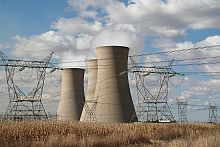Towards a new nexus of power and accountability in SA energy
|
In July, SAEON participated in the SA Civil Society Energy Caucus Meeting hosted by the Institute for Security Studies’ Corruption and Governance Programme.
The purpose of the two-day meeting, which was held in Cape Town, was for civil society to explore the country’s willingness and ability to deal with fierce governance challenges ahead, and create benchmarks for a sustainable, socially just future.
The meeting served as a sequel to a climate change adaptation workshop for civil society and researchers that was held in Johannesburg in June. Both events were aimed at finding ways to mitigate climate change within the energy sector.
Opportune time for civil society
The timing of the event just after the recent announcement of the decoupling of the Department of Minerals and Energy, and five months ahead of the UN COP15 was not coincidental. It is believed that civil society is now presented with an ideal opportunity to engage with energy governance issues with vigour and purpose in order to make a meaningful input to local and international debates and actions.
During the workshop there were several presentations related to the workshop theme, The new nexus of power and accountability in South African energy. These were followed by open discussions and debate. Participants represented various organisations, including non-governmental organisations, political parties and unions.
Topics covered included vision and leadership in confronting energy and sustainable development challenges; monitoring accountability and transparency deficits; “retrogazing” energy governance in South Africa; electricity price hikes; engaging the African region in Copenhagen and beyond; the true cost of coal; and technofixing a way out of the energy crisis.
The new department will need to outline its strategy on a just transition away from fossil fuels to a no-carbon future that will also create new green jobs. They will need to deal with a host of other governance and institutional issues, including resolving its murky relationship with state electricity utility Eskom.
In particular, issues that relate to Eskom and Nersa need to be addressed and conflicts of interest which prevent the national regulator from carrying out its key tasks need to be resolved. This will need a deeper engagement with citizens — listening to their needs, being open and transparent, including them in all decision-making processes and fostering accountability.
Key issues on the table included mitigation-emission reduction targets for 2020 and 2050; adaptation, finance, technology co-operation, institutional arrangements and the carbon market mechanism.
The way forward
In mapping the way forward, participants stressed the need for a single voice to represent civil society; energy governance; accountability and transparency in oversight structures; and adjusting the methods and strategies used to engage with different role-players such as the Department of Energy/government, Eskom, Nersa, relevant departments, other groups in civil society, and corporates.











